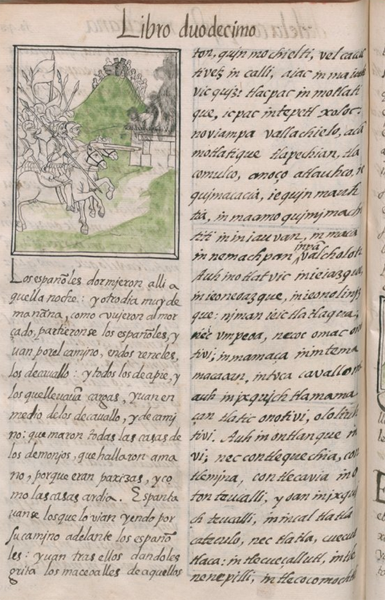Folio 48 verso
Translations and Transcriptions
Spanish Translation
[Translation of the Nahuatl into Spanish by Fr. Bernardino de Sahagún; transcription of the Spanish (left-hand column) by James Lockhart:] [f. 48v.] [Un dibujo, y luego:] Los españoles dormieron alli aquella noche: y otro dia muy de mañana, como vuieron almorçado, partieronse los españoles, yuan por el camino, en dos rencles, los de cauallo: y todos los de a pie, y los que lleuauā cargas, yuan en medio de los de cauallo, y de camino: quemaron todas las casas de los demonios, que hallaron a mano, porque eran paxizas, y como las casas ardia. Espantauanse los que lo vian yendo por su camino adelante los españoles: yuan tras ellos dandoles grita los maceoalles de aquellos
English Translation
[Translation of the Nahuatl (right-hand column) by James Lockhart:] awaited them. The houses were entirely empty; no one at all came out toward them. They hid above, on top of Mount Xoloc, from where one looks out in all directions. They did not hide anywhere on plains, in gullies, or in ravines, apprehensive and afraid lest their enemies spring upon them without warning, unawares. And when dawn came and they were about to go, make their departure, and break camp, then they ate and got on their way. On both sides of the road came their people-bearing deer, called horses, and all those who bore burdens went gathered together inside [the rows]. And just as they were going they set fire to, ignited and burned the Otomi temple and all the other temples, houses of demons. Then they burned and crackled, there were tongues of flame and smacking sounds; [Translation of the Spanish (left-hand column) by James Lockhart:] The Spaniards slept there that night. The next morning very early, after breakfasting, the Spaniards left. The horsemen went along the road in two files, and all the footmen and those who carried loads went on the road in the middle of the horsemen. They burned all the houses of demons that they found at hand, because they were of thatch, and when the houses started burning, those who saw it were shocked. As the Spaniards went ahead on their way, the macehuales of those places went behind them shouting at them,
Analytic Transcription
[Transcription of the Nahuatl (right-hand column) by James Lockhart:] [f. 48v.] ton, quinmochielti,vel cacactivetz in calli, aiac in ma ivic quiz: tlacpac inmotlatique, icpac in tepetl xoloc: noviampa vallachielo, acā motlatique tlapechian, tlacomulco, anoço atlauhco,ie quimacacia, ie quinmauhtia, in ma amo quimimachititi in iniauvan, in maca innemachpan inpā valcholoti. Auh in otlatvic in ie iazque, in ie oneoazque, in ieonolinizque: niman ie ic tlatlaqua; ie ic vmpeoa, necocomac onotivi; in mamaça in intemamacaoan, intoca cavallome: auh in ixquich tlamama çan tlatic onotivi, ololiuhtivi. Auh in ontlanque in vi; nec contlequechia, contlemina, contlecavia in otonteucalli, yoan in ixquichteucalli, in incal tlatlacateculo, nec tlatla, cuecuetlaca: in tlecueçallutl, in tlenenepilli, in tlecocomochtli
Image

Spanish Translation
[Translation of the Nahuatl into Spanish by Fr. Bernardino de Sahagún; transcription of the Spanish (left-hand column) by James Lockhart:] [f. 48v.] [Un dibujo, y luego:] Los españoles dormieron alli aquella noche: y otro dia muy de mañana, como vuieron almorçado, partieronse los españoles, yuan por el camino, en dos rencles, los de cauallo: y todos los de a pie, y los que lleuauā cargas, yuan en medio de los de cauallo, y de camino: quemaron todas las casas de los demonios, que hallaron a mano, porque eran paxizas, y como las casas ardia. Espantauanse los que lo vian yendo por su camino adelante los españoles: yuan tras ellos dandoles grita los maceoalles de aquellos
English Translation
[Translation of the Nahuatl (right-hand column) by James Lockhart:] awaited them. The houses were entirely empty; no one at all came out toward them. They hid above, on top of Mount Xoloc, from where one looks out in all directions. They did not hide anywhere on plains, in gullies, or in ravines, apprehensive and afraid lest their enemies spring upon them without warning, unawares. And when dawn came and they were about to go, make their departure, and break camp, then they ate and got on their way. On both sides of the road came their people-bearing deer, called horses, and all those who bore burdens went gathered together inside [the rows]. And just as they were going they set fire to, ignited and burned the Otomi temple and all the other temples, houses of demons. Then they burned and crackled, there were tongues of flame and smacking sounds; [Translation of the Spanish (left-hand column) by James Lockhart:] The Spaniards slept there that night. The next morning very early, after breakfasting, the Spaniards left. The horsemen went along the road in two files, and all the footmen and those who carried loads went on the road in the middle of the horsemen. They burned all the houses of demons that they found at hand, because they were of thatch, and when the houses started burning, those who saw it were shocked. As the Spaniards went ahead on their way, the macehuales of those places went behind them shouting at them,
Analytic Transcription
[Transcription of the Nahuatl (right-hand column) by James Lockhart:] [f. 48v.] ton, quinmochielti,vel cacactivetz in calli, aiac in ma ivic quiz: tlacpac inmotlatique, icpac in tepetl xoloc: noviampa vallachielo, acā motlatique tlapechian, tlacomulco, anoço atlauhco,ie quimacacia, ie quinmauhtia, in ma amo quimimachititi in iniauvan, in maca innemachpan inpā valcholoti. Auh in otlatvic in ie iazque, in ie oneoazque, in ieonolinizque: niman ie ic tlatlaqua; ie ic vmpeoa, necocomac onotivi; in mamaça in intemamacaoan, intoca cavallome: auh in ixquich tlamama çan tlatic onotivi, ololiuhtivi. Auh in ontlanque in vi; nec contlequechia, contlemina, contlecavia in otonteucalli, yoan in ixquichteucalli, in incal tlatlacateculo, nec tlatla, cuecuetlaca: in tlecueçallutl, in tlenenepilli, in tlecocomochtli
Image
